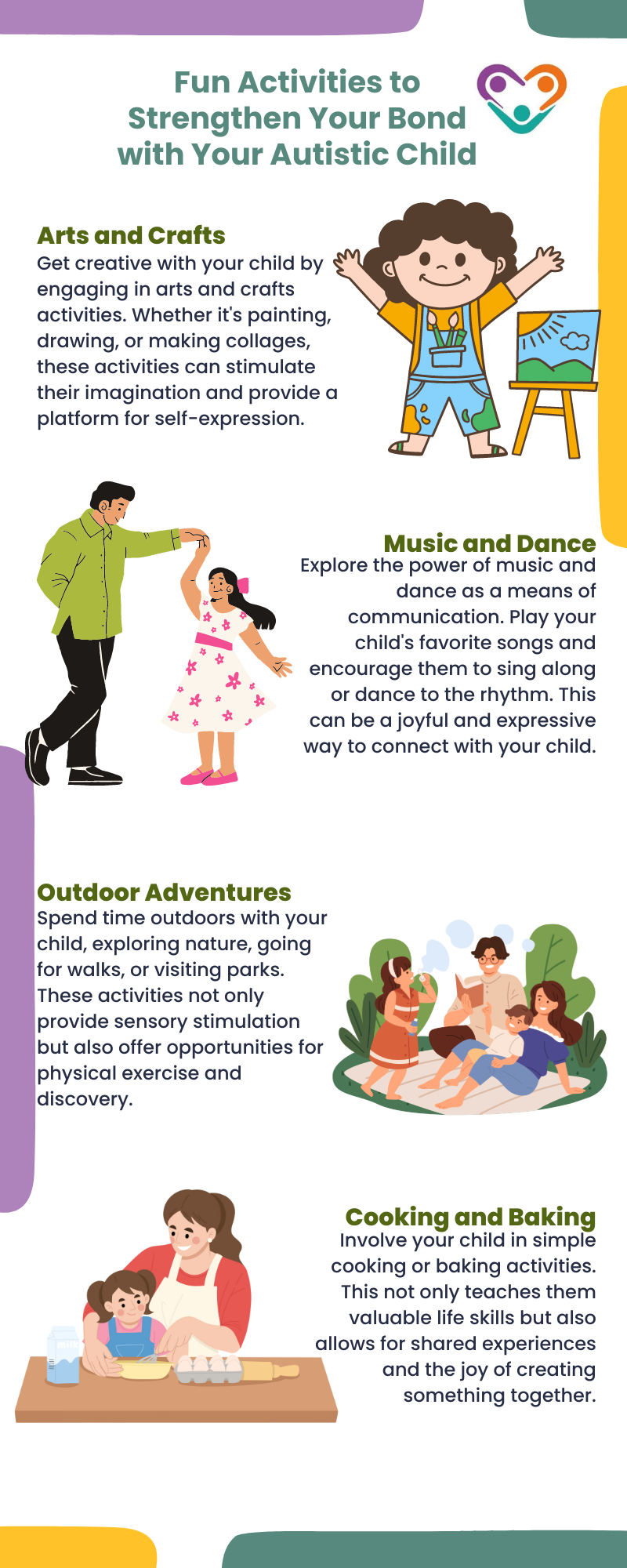Supporting positive behaviors is crucial for the development and overall well-being of an autistic child. By implementing effective strategies, parents and caregivers can create a nurturing environment that promotes growth and progress.
Here, we’re going to cover a bunch of things that parents should know when it comes to taking care of their autistic children.

Reinforcement and Rewards
Children with autism spectrum disorder often respond well to positive reinforcement. Praising them for their good behaviors can make them feel good and encourage them to continue exhibiting those behaviors. However, it’s important to be specific in your praise, highlighting the specific behavior you want to reinforce.
For example, instead of saying “Good job,” you can say “Great job sharing your toys with your sibling!”
In addition to verbal praise, finding ways to reward your child can be beneficial. This can be done through a system of tokens, where they accumulate tokens for positive behaviors and can exchange them for rewards like extra playtime or small prizes such as stickers or a favorite activity.
The key is to choose rewards that are meaningful to your child and motivate them to continue engaging in positive behaviors.

Consistency in Interaction
Consistency and routines play a vital role in supporting individuals on the autism spectrum. Establishing a predictable environment can help children with autism feel more secure and make learning new skills and behaviors easier. Consistency should extend to the way parents and caregivers interact with the child.
It’s important to provide consistent guidance and interaction, aligning with techniques and methods from therapy. By maintaining consistency in your approach, you can help individuals with autism apply their knowledge and skills in different situations. This can be achieved by using visual supports, clear communication, and predictable routines.
Consistency also applies to responding to challenging behaviors. It’s important to establish clear expectations and consequences for negative behaviors while reinforcing positive alternatives. Consistency in your responses can help individuals with autism understand boundaries, learn appropriate behaviors, and feel more secure in their environment.
Building Strong Connections
Building strong connections is key to fostering development and well-being when parenting a child with autism. That said, let’s explore some fun activities that you can use for bonding with your child.
Fun Activities for Bonding
Engaging in activities purely for fun can help children with autism spectrum disorder open up and connect with their parents or caregivers. These activities provide an opportunity for shared experiences, enjoyment, and building trust.
Here are some ideas for fun activities that can strengthen your bond:

Remember, the focus of these activities should be on enjoyment and connection rather than achieving specific goals. Allow your child to take the lead and follow their interests and preferences.
Since parenting a child with autism can be challenging, having a strong support network is essential. Support from other families, professionals, and friends can provide advice, information, and understanding from others who are facing similar challenges.
Here are a few reasons why support networks are important:
- Emotional support – Connecting with other parents who are going through similar experiences can provide a sense of validation, comfort, and encouragement. Sharing your journey with others who understand can alleviate feelings of isolation and provide a space to express your emotions.
- Information and resources – Support networks can be a valuable source of information about available services, therapies, and educational resources. Other parents may have insights and recommendations that can help you navigate the system and access the best support for your child.
- Advocacy and empowerment – Being part of a support network can empower you as a parent to advocate for your child’s needs effectively. Group discussions and shared experiences can provide knowledge and strategies to navigate challenges and promote positive outcomes for your child.
Consider joining a local support group specifically for parents of children with autism. These groups often offer a safe and understanding environment where you can share experiences, exchange advice, and gain insights from each other.
In addition to support groups, professional counseling can be beneficial for parents, providing a space to discuss concerns, manage stress, and develop coping strategies.

Educational Support and Advocacy
Parents and caregivers play a crucial role in advocating for their children with autism and ensuring they receive the necessary educational support.
Children with autism are eligible for educational services through their public school system. These services are designed to meet the unique needs of children on the autism spectrum and provide them with the support and resources necessary for their academic success.
There are two common forms of educational plans for children with autism which are:
- Individualized Education Plan (IEP) – An IEP is a personalized plan developed specifically for the child, outlining their educational goals and the services and accommodations required to achieve them. It is collaboratively created by a team of professionals, including teachers, therapists, and parents, to address the child’s individual needs.
- 504 Plan – A 504 plan is another form of support provided to children with disabilities, including autism. It ensures that students have equal access to education by outlining specific accommodations and modifications that can help them succeed in the classroom. Unlike an IEP, a 504 plan does not require specialized instruction but provides necessary support.
These educational plans aim to create an inclusive learning environment and support the child’s social, emotional, and academic development. Working closely with the school, parents can actively participate in the creation and implementation of these plans, ensuring that their child’s specific needs are met.

Effective Management Strategies
When parenting a child with autism, parents should implement effective management strategies that can make a significant difference in their development and well-being.
In this section, we’ll look at two important strategies that can significantly help. These are as follows:
Therapeutic Interventions
Therapeutic interventions play a crucial role in the management of autism spectrum disorder. One widely recognized approach is Applied Behavioral Analysis (ABA) therapy. ABA therapy focuses on reinforcing positive behaviors and teaching new skills through structured and systematic interventions. It has been shown to be effective in improving communication and social skills, as well as in reducing challenging behaviors.
Beyond ABA therapy, there are various other therapeutic interventions that can benefit individuals with autism. Occupational therapy helps develop skills necessary for daily activities, such as self-care and fine motor skills. Speech therapy targets language and communication abilities, while physical therapy focuses on improving gross motor skills.
In addition to these specific therapeutic interventions, visual supports are essential for individuals with autism. Visual schedules, social stories, and visual cues provide consistency, predictability, and clear communication, which can greatly enhance understanding and reduce anxiety.
Embracing Individuality
Embracing the individuality of children with autism is an essential aspect of effective management. Each child with autism has their own unique perspective and way of experiencing the world. It is important for parents and caregivers to recognize and appreciate these differences, celebrating them rather than viewing them as deficits.
Communication is a key component of embracing individuality. While some children with autism may struggle with verbal communication, it is important to remember that communication comes in many forms.
Encouraging alternative means of expression such as sign language, picture cards, or communication apps can help bridge the communication gap and empower children to interact and express themselves effectively.
Creating a structured environment is another way to embrace individuality. Children with autism often thrive in environments that offer consistency and predictability. Establishing a structured daily routine can help reduce anxiety and behavioral outbursts, providing comfort and stability in their lives.
By implementing therapeutic interventions and embracing the individuality of children with autism, parents and caregivers can provide them with the support and tools they need to thrive. It is important to remember that each child is unique, and finding what works best for them is key to their overall development and well-being.
Research continues to shed light on the neurological basis of sensory issues in autism, offering hope for more targeted and effective therapies in the future. By recognizing and addressing sensory processing difficulties, we can improve the quality of life for individuals with autism and their families. If you’re seeking specialized ABA therapy in New Jersey, Indiana, Georgia, and New York, Golden Care offers comprehensive services tailored to meet the unique needs of each individual. Contact us to learn more or book a consultation today.
Sources:
https://americanspcc.org/parenting-a-child-with-autism-8-things-you-should-know
https://www.webmd.com/brain/autism/parenting-child-with-autism
https://www.focusonthefamily.com/parenting/what-parents-need-to-know-about-autism
https://autismawarenesscentre.com/5-things-every-parent-should-know-when-raising-an-autistic-child
https://www.psychologytoday.com/intl/basics/autism/parenting-a-child-with-autism



